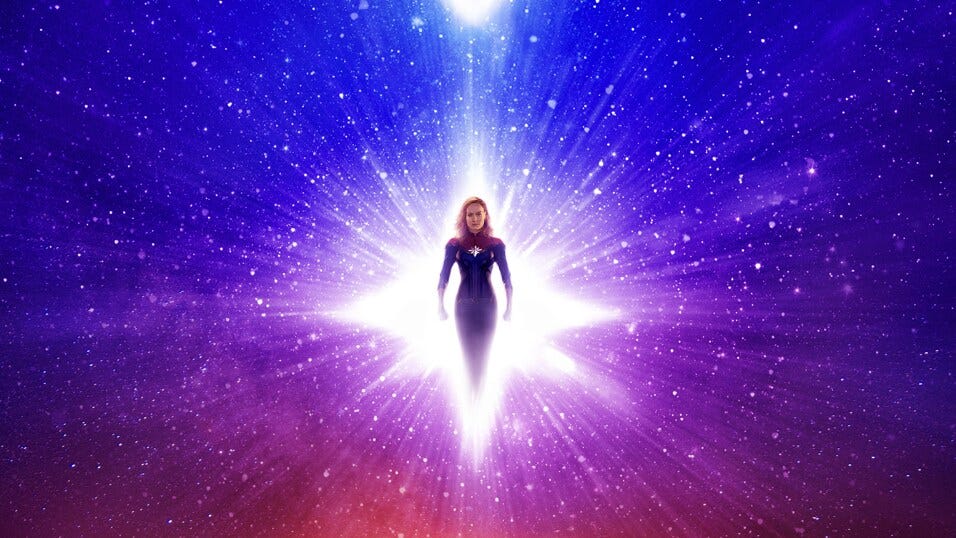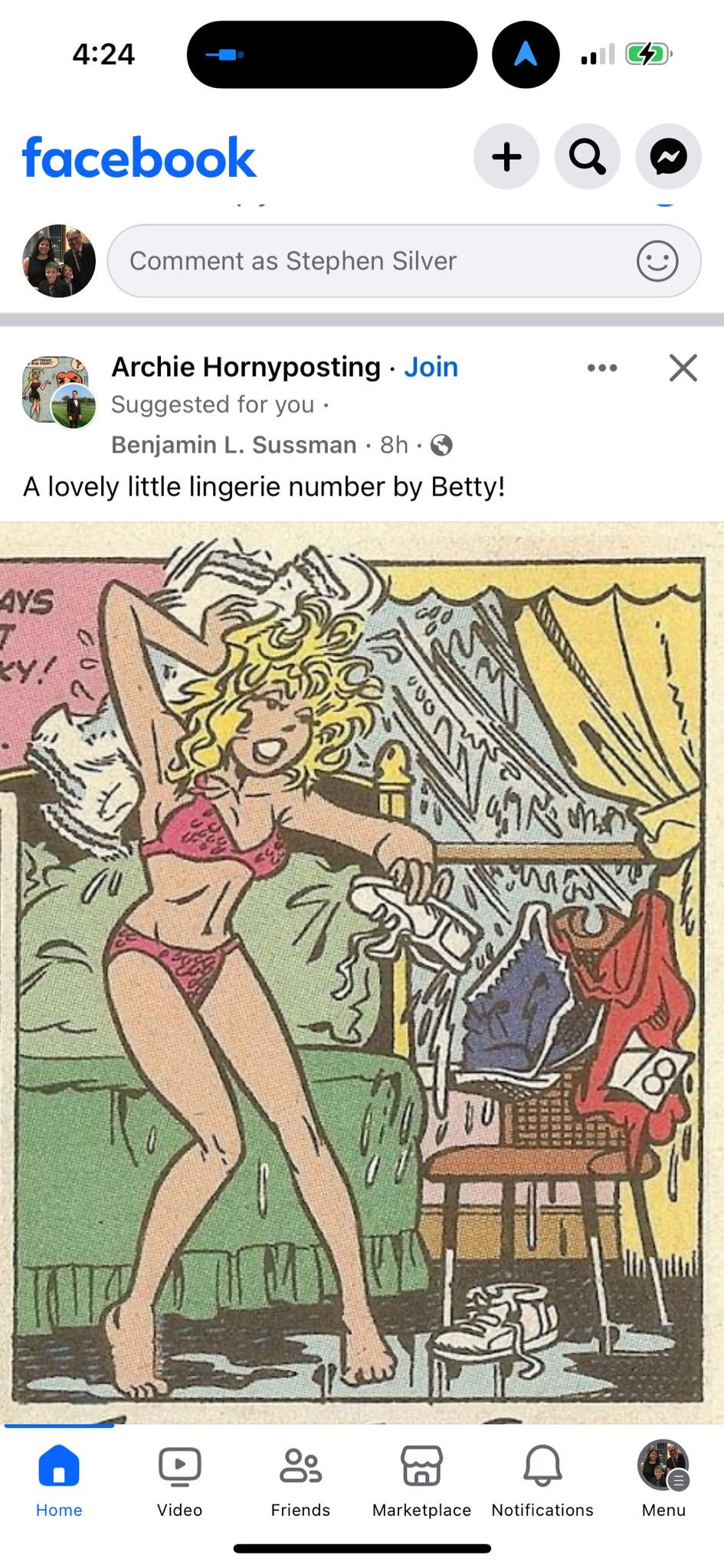Fin: Real and fake reasons why 'The Marvels' tanked
Plus, Marty McFly wins at the CCA Documentary Awards, Kelly Oubre vs. Philly Crime Twitter, and Elon Musk: The Movie
The latest MCU film, The Marvels, was a box office disappointment, as you may have heard. The film made just $47 million at the domestic box office in its opening weekend, the lowest total in the MCU’s 15-year history.
Why did this happen? A few reasons have been bandied about, some legitimate, some not. There is, undoubtedly, some fatigue with these movies, especially after this many years of saturation. It was probably a mistake on Disney’s part to make understanding these movies depend on having watched multiple Disney+ shows, which at this point are starting to feel like homework. Since the actors’ strike didn’t end until days before the release, the actors were not able to promote it. The movie also didn’t get great reviews, although it’s never stopped MCU movies from being huge hits before (I found it middling, but far from the worst in the series.)
There are some reasons for the flop that are less a reason why, including the ubiquitous “go woke, go broke” theory. The weakness in that theory is that it doesn’t require one to see the movie- only to point to the movie centering on three women, two of them being women of color (and the first Captain Marvel movie was a huge hit). This just shows how meaningless the term “woke” is- it means “college students yelling about how the October 7 attacks were deserved,” but it also means “they made a comic book movie with three women in it.”
And besides, there isn’t anything “woke” about the plot of the movie itself, which contains the usual mumbo-jumbo about the heroes and villains both wanting the same shiny object and some separate mumbo-jumbo about the space-time continuum and alternate universes.
And finally, unless you work for a studio, box office results, whether good or bad, are a dumb thing to gloat about.
Then there was this nonsense, from Chris Gore, one of the original Internet film guys from the ‘90s:
Of the more than 33 MCU movies released so far, do you know how many had female protagonists? Two. Which for this dude, it appears, are two too many.
I’m not sure where it hit the film geek community that their favorite entertainment is ruined by having girls participate in it, but most of us get over that attitude by the time we turn 12 or 13.
STILL the winner
I was up in New York last weekend for the annual Critics Choice Documentary Awards, and the big winner was STILL: A Michael J. Fox Movie, which won Best Documentary and every other award for which it was nominated. (I reviewed the movie in the spring.)
It’s a fun event to attend, and the documentary crowd are all interesting people to talk to.
The highlight of the night? MSNBC’s Lawerence O’Donnell was presented the Best True Crime Documentary award and paused beforehand to make fun of Telemarketers, for being about something lower-stakes than the various murders, mayhem, and Murtaughs of the other categories. And then, Telemarketers was named the winner.
Kelly Oubre, Jr. vs. Philly Crime Twitter
The biggest story in Philly in the last week has been what did (or didn’t) happen to Kelly Oubre, Jr. in Center City.
Oubre is a veteran NBA player who signed with the 76ers this year, and in the early going has been playing the best basketball of his career. Last week, it was reported that Oubre had been hit by a car on a Center City street, and was expected to miss “significant time,” with what was first reported as a broken rib.
Then, days later, rumors started to bubble up from what I’ll call “Philly Crime Twitter.” That’s what I call the cluster of social media accounts that specialize in videos of looting, vitriol directed at District Attorney Larry Krasner, and spreading the notion that Philadelphia is a disgusting, unsafe hellhole, with that notion spread in more or less overtly racist terms, depending on the account. There’s a version of this, I’m sure, in every big city.
The rumors were that Oubre had not been hit by a car and that the injuries had come from some other incident (there were vague insinuations of a “domestic violence” episode.) Comparisons were made, of course, to Jussie Smollett. The Oubre injury did not have any political or racial element, nor did he ever claim it was a hate crime, although those who remember the Smollett incident may remember that Chicago cops were leaking to the press nonstop about their doubts.
A few days in, the case remains a mystery. In a city where there are surveillance cameras everywhere, police have not found a video showing Oubre’s accident, although it’s very possible that the player, who has only lived in Philadelphia for a few weeks, might not have known what street he was on. A video surfaced, from the player’s Ring camera, showing him arriving back at his home, raising all sorts of questions about where it came from.
This is one of those stories where the next big scoop could come from anywhere- maybe ESPN’s Adrian Wojnarowski, or possibly Fox 29’s Steve Keeley.
The long life of the “North Kosan” clip
Last week, there was a report that major news outlets were using stringers, in reporting on the conflict in Israel and Gaza, who may have been actively participating in Hamas’ attacks- although the report quickly fell apart within 24 hours.
This has raised ethical questions about how reporters should conduct themselves in wartime- and it led a lot of people to re-post (or discover for the first time) the “North Kosan” episode.
If you’re not familiar: It’s from the late 1980s, on an episode of a public television series called Ethics in America. The Harvard Law School Prof. Charles Ogletree is interviewing a group of politicians, journalists, and soldiers about hypotheticals in wartime.
In the most famous segment, two top news anchors of the time, Peter Jennings and Mike Wallace, are given a hypothetical: You are covering a war in which the U.S. is involved, in a country called North Kosan (meant to represent Korea and Vietnam). You are permitted to embed with a North Kosan unit which is on the opposite side of the war of the Americans. While on this assignment, you come across an American unit that’s about to be ambushed. Do you watch, and report on the massacre, or do you warn the American unit, even if it means losing the story, and probably also your life?
This is a shortened version of the conversation:
Jennings answered that he would warn the Americans, while Wallace said that he wouldn’t, while angrily mocking his colleague, leading Jennings to backtrack. Then the military men in uniform — and also, Newt Gingrich, for some reason — mock the journalists as unpatriotic cowards.
I first heard about this from an article, and later a book, by James Fallows, that I believe I read in a college journalism class, during my freshman year. Fallows positioned it as “Why We Hate the Media,” but watching it again today I had a different reaction, as did a lot of people from what I saw: This type of heady, morally complex discussion about matters of life, death and war is practically unimaginable on television today.
Somebody, please, bring back Ethics in America! Just don’t let Newt come back on.
This week in weird Facebook content that was served to me
I got served this yesterday:
I’m not sure what data Facebook has on me that indicates I would be interested in “Archie hornyposting,” yet serve it to me they did for some reason. I’ve only seen one or two episodes of Riverdale. I guess it’s possible I at some point posted the “Archie and Jughead were lovers” argument from Chasing Amy, but…
I was going to say TikTok is beating the incumbent social media companies because their algorithm is so much better at giving people what they want, but that was before its users started approvingly sharing a Bin Laden tract…
This week’s writings
This week, here on the Substack, I wrote about why Hamas won’t be moved by Steven Spielberg and wrote about two movies set during the Napoleonic Wars: The 20-year-old Master and Commander: The Far Side of the World and the new Napoleon. And I reviewed five selections from the DOC NYC festival.
Outside of here, I reviewed Todd Haynes’ May December for Splice Today, and Remembering Gene Wilder, the opening night of Philadelphia Jewish Film and Media’s Fall Fest, for Broad Street Review. I also wrote about another film at that festival, Alliance, for the Philadelphia Inquirer.
For 19FortyFive, I interviewed a legal expert about Trump’s entanglements.
Next week: I’ll be writing about why the death of sex in the movies has been greatly exaggerated, and review some new animated films and a documentary about wrestling.
Also, by way of a heads-up, I’m aiming at launching subscriptions the first week in December. As always, thank you for your support.






